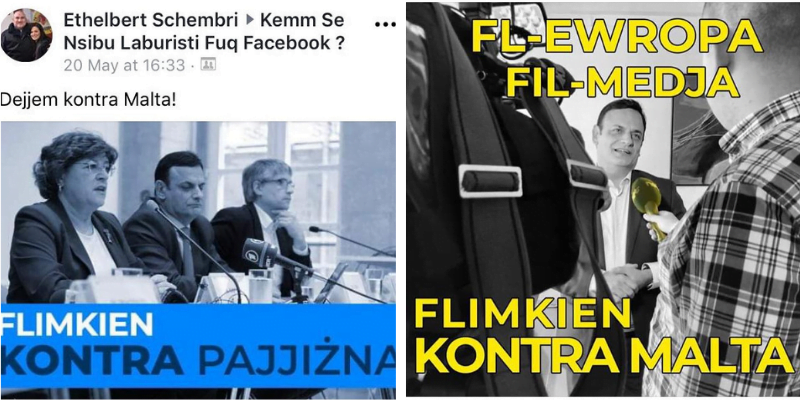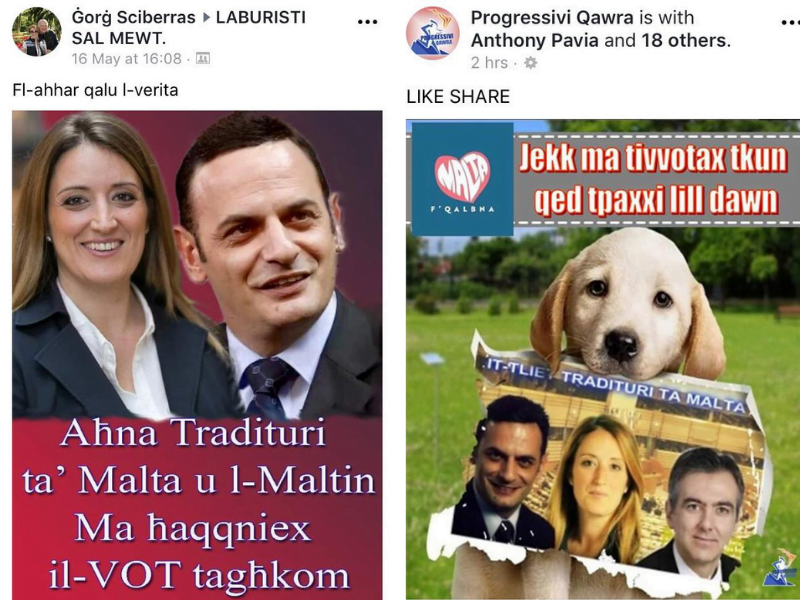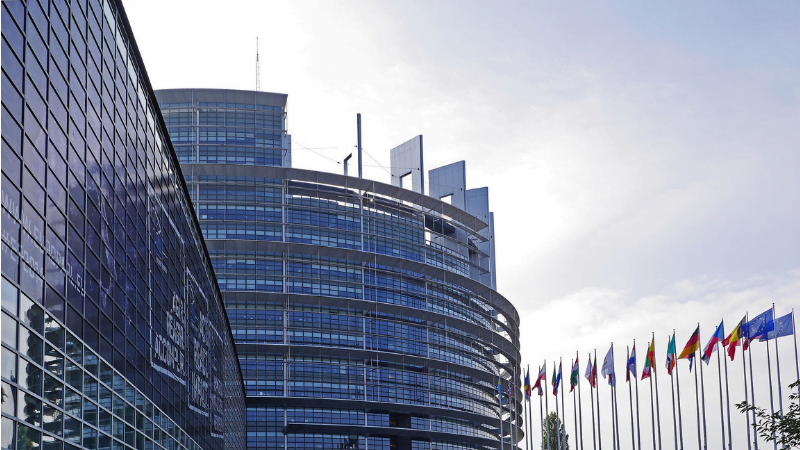-
MEP candidates agree that press freedom and the rule of law are serious concerns impacting citizens’ freedoms, except for Labour Party candidates.
-
Labour Party candidates’ notion of ‘defending Malta’s name’ is to bury criticism of the government, even if this goes against individual freedoms.
-
Largest Labour online hate group reactivated in the lead up to the election, viciously targeting those MEPs most effective in exposing government corruption.
Much has been said about declining press freedom in the country, an issue that although brewing for years came to international attention with the assassination of journalist Daphne Caruana Galizia soon after the last general election. As citizens are preparing to vote in the European Parliament elections on Saturday, The Shift has asked MEP candidates about the priority they give to the issue, requesting also that they list the action taken, in real terms, to sustain their pledge (answers below).
On Saturday, people will also be voting for local councils. Yet, the campaigns have largely focused on the more high-stakes European elections, eclipsing in the process those for the local councils.
The leaders of the two main political Parties have framed the people’s choice in the next election in binary terms. Labour Party (PL) Leader Joseph Muscat has framed this as a contest between two political leaders, while Nationalist Party (PN) Leader Adrian Delia has said a vote for Labour is a vote for abortion.
Neither one is true.
In that sense, the Opposition Leader was right when saying in the final debate of the electoral campaign that “these elections are not what we say they are. They are an election to elect MEPs and local councillors”.
These narratives have no basis in reality. This has to be said bluntly, because so much is at stake and because citizens deserve the truth. Unsurprisingly, it is the incumbent MEP candidates who have shown the best understanding of how the issues discussed in the European Parliament affect our lives. Freedom of expression is one of them, and a priority in the current context.
The government insists there is no problem even as a number of international institutions are increasingly raising concerns on the rule of law and press freedom in the country. Muscat’s reaction to a scathing report by the Council of Europe’s Special Rapporteur was to cast doubt on his integrity and call him “a friend of the PN” – much the same way he deals with criticism from citizens and journalists exposing scandals by those closest to him in “a culture of impunity” noted by a number of international institutions and watchdogs.
It is perhaps for this reason that the PL campaign has targeted so viciously those PN MEPs who have been the most effective in ensuring scrutiny of Muscat’s actions in protecting those responsible for documented corruption backed by evidence.
One of the PL’s largest Facebook groups used to target citizens, journalists and Opposition candidates revealed in an investigation by The Shift News, has been reactivated in the lead up to the elections, and PL officials spread memes targeting PN MEPs David Casa and Roberta Metsola.

A target: PN MEP David Casa formed part of the MEP rule of law delegation to Malta (centre) with other members Socialist MEP Ana Gomes and Greens MEP Sven Geigold.
The government’s targeting of individuals, its denials, spin (even outright disinformation) and prevarication inevitably lead to further criticism and scrutiny. This was acknowledged as a serious concern by candidates across political parties. PD Leader and MEP candidate Godfrey Farrugia condemned social media hate groups where “it has become permissible for Labour loyalists to demonise critics of the government”.
Alternattiva Demokratika candidate Carmel Cacopardo said, “the rule of law is under assault”. Arnold Cassola, now running as an independent candidate, has regulary posted his concerns on social media. Another independent candidate, Antoine P. Borg, has made a pledge to the European Federation of Journalists. PD candidate Cami Appelgren had to withdraw from social media in the last week of the election because of serious threats to her life.
None of this was seen as a problem for PL candidates who defended the government’s stand. Are they protecting the interests of Maltese citizens or defending Muscat, Mizzi and Schembri at all costs?
The state of things
The government’s stand was reflected in the answers of all PL MEP candidates who chose to respond. Those who did, sent similar replies parroting the same list of points that the government seems to just recite ad nauseam when faced with criticism. Most, did not even bother sending an answer and this said much more than any answer given.
They included former Labour Party leader Alfred Sant, as well as Josef Caruana who caused a stir following the last general election when he name-dropped individual critical journalists including Caruana Galizia as “traitors standing in the way of Maltese progress” saying “a cleansing process should start” and that they should “disappear”. It does not take a genius to assess where Caruana stands on the liberty of the press.
The former editor of L-Orizzont was given a position at the Prime Minister’s Office following those remarks, and he is now a candidate for the European Parliament where critical policy decisions that affect the lives and work of journalists in Europe are shaped. This is, in itself, a reflection of an approach that is incompatible with European values and the importance given to freedom of expression as a fundamental human right.
Yet, PL candidates all praised the government’s track record on press freedom. They consistently referred to the near immediate arrest of three suspects for Caruana Galizia’s assassination (in a trial that has not yet commenced) and the re-enactment of the Media and Defamation Act, which outlawed some of the tormenting tools such as criminal libel and garnishee orders. Ironically, these were used by PL MPs and government officers against Caruana Galizia. They all said the government was committed to holding a public inquiry, even as it is being denied.
PN candidates expressed concern on the decline of press freedom and an awareness of the main issues facing journalists today, including lawsuits intended to financially cripple journalists (known as SLAPP) and online threats and harassment. David Stellini was the only PN MEP candidate not to send in answers. The incumbents have a solid track record of action taken to defend press freedom.
Candidates from Partit Demokratiku (PD) and Alternattiva Demokratika (AD) stressed the rule of law and the need to ensure press freedom as a priority, as did independent candidates. It is a common theme across all parties and candidates, except those of the PL – there is concern on the rule of law and the restrictions being placed on journalists.
They agree that defending Malta’s interests go hand-in-hand with the fight against corruption and abuse, and that it is the duty of journalists to expose wrongdoing.
Joseph Muscat’s ‘traitors’
Incumbent MEPs Casa, Metsola and Francis Zammit Dimech listed their efforts in the European Parliament to address press freedom issues in the country and the investigation into Caruana Galizia’s assassination.
Casa has paid the price as planted stories in Malta Today attempted to discredit him. Despite the admission that the story was based on material created in the editor’s office, the lie was revived in the Labour Party’s secret online hate groups. Echoing similar nationalistic campaigns in Hungary and Poland, Casa and Metsola have been the main target of a Labour Party campaign branding them as “traitors”.
None of this deters Casa: “The mastermind responsible for the assassination of Daphne Caruana Galizia must be brought to justice. It is an imperative… We have witnessed the stifling of activists’ calls for justice, the refusal to hold an independent public inquiry and the capture of our institutions”.
He mounted a defence of Maltese media houses threatened with financially-crippling lawsuits from Pilatus Bank and he formed a group of cross-party MEPs to lobby for anti-SLAPP legislation. He has taken a personal interest in cases affecting individual journalists even beyond Europe. His work for the protection of whistleblowers was reflected in the Whistleblower Directive, on which MEP Francis Zammit Dimech was also involved.
He has taken forward the call by Reporters Without Borders for a European Commissioner for press freedom. Casa wrote to all European Commission Presidential candidates seeking a pledge, while telling them the Commission had been “slow and complacent” on crucial press freedom issues.
Together with Metsola, as coordinator of the LIBE committee who was involved in the rule of law delegation, the MEPs ensured that that European Parliament resolutions gave importance to issues related to Caruana Galizia and press freedom. This was work ‘against Malta’s interests’, Labour MEP candidates have charged.

Labour’s online hate groups target Opposition MEP candidates.
Metsola points out that the rule of law in Europe depends on a free press and lists the benefits to journalists working in the public interest: “We have worked to improve protection given to jouralistic sources, we have passed grounbreaking whistleblower legislation and have pushed for EU legislation against SLAPP lawsuits in the EU – something that will take precedence in the coming legislature. In this legislature, we have also confirmed dedicated EU funds to help investigative journalism around Europe”.
Problem? What problem?
PL candidates claim that the press is “untouched” and operates “without fear” as journalists are given “unfettered access” to government issues. They may have been talking about those sitting at the Party’s media house, but otherwise their stand serves to bury concerns on press freedom to protect the reputation of the Party in government. It does nothing to help Malta.
Their stand ignores the country’s decline in press freedom rankings and independent journalists’ complaints on lack of access to the Prime Minister who has refused interviews with the independent media since the last general election. Major contracts signed are often redacted, or not published at all, and freedom of information requests are more often than not, denied.
Concerns on press freedom were also raised by the Council of Europe’s Special Rapporteur Pierter Omtzigt in the draft assessment. He notes that Freedom of Information requests are regularly obstructed, and that the Whistleblower Act in Malta does not protect those who report to the media.
While PL candidates all said the government was “committed to ensuring justice is served,” in the Caruana Galizia case, the Special Rapporteur notes that “even after her death, there remains an appearance of government hostility towards Ms Caruana Galizia”.

Celebration of Daphne Caruana Galizia’s death in Labour’s online groups exposed by The Shift News.
It is true the government has enacted laws that improve the situation on paper, but this is not reflected in reality. The Labour government has considered whistleblowers only as those prepared to blow the whistle on the Opposition or those that fall out of favour. But whistleblowers that report on current abuse or those the government considers inconvenient are not protected and often bullied into silence.
Former FIAU official Jonathan Ferris was fired, threatened with arrest and he fears for his life. Maria Efimova fled to Greece where a Maltese extradition order for her was refused. Atansov Valery, the Malta Gaming Authority (MGA) IT employee who blew the whistle in 2014 in relation to online gaming, was disciplined, fired from his job and is even being sued by the MGA for defamation.
On the other hand, those who exposed wrongdoings “useful” to the government were awarded with millions in contracts.
Libel suits are still used to threaten and silence journalists including SLAPP lawsuits, and the government has refused to provide Maltese journalists with protection against vexatious yet financially crippling lawsuits filed abroad. The Prime Minister is among those who continue to pursue libel cases against Caruana Galizia posthumously.
It’s your choice
Since the Labour Party was elected in 2013, Malta’s press freedom rankings plunged 32 places, 12 places in the last year alone. Its media landscape is described as “increasingly hostile” for independent journalists and serious concerns have been raised over the control the government exerts over television and print media.
These concerns have been echoed by the Council of Europe, the United Nations, the European Parliament, the Venice Commission, GRECO and countless other independent human rights and press freedom organisations.
Yet, to date no one knows who commissioned the murder and according to reports, no politically linked persons have been interrogated in connection with the case. Also, calls for a public inquiry from the family, international legal experts, the European Parliament, the UN, the Council of Europe and the EU, have all been refused.
This does not amount to “no stone left unturned”, a commitment Muscat made following the journalist’s assassination. The Caruana Galizia family has been forced to resort to litigation citing a breach of the ECHR’s right to life, to see that an inquiry is launched.
What you believe largely depends on where you’re standing in the political spectrum and what is important to you. Whom you vote for and what they choose to prioritise and defend will have an impact on your daily life. What is decided by our representatives in Brussels, has to be implemented in Malta.
Remember, press freedom is about defending your right to know and, since democracy relies on well informed citizens, democracy itself.
The analysis was by Caroline Muscat.
Read what each candidate had to say:
Candidates for European Parliament elections were sent this question for an article assessing the priority given to press freedom:
The unsolved murder of Daphne Caruana Galizia has resulted in a serious drop in Malta’s press freedom rankings, as well as substantial criticism from the EU, Council of Europe, European Parliament, United Nations, and many human rights and media freedom watch dogs. What have you done and what will you do if elected to ensure that the mastermind of her assassination is identified and justice is served, as well as to address the various forms of threats to investigative journalists in the country that would enable an improvement in Malta’s press freedom rankings?
[WPSM_AC id=19290]
[WPSM_AC id=19285]
[WPSM_AC id=19296]
[WPSM_AC id=19297]
[WPSM_AC id=19298]
[WPSM_AC id=19301]












